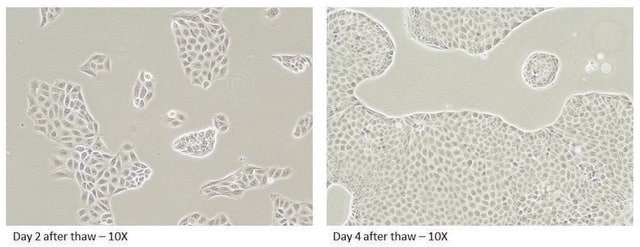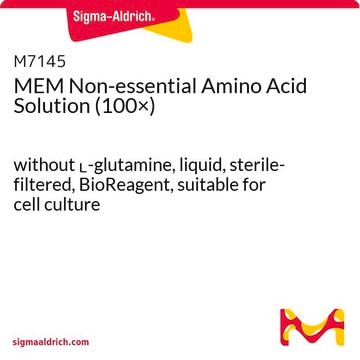SBVT17
SB-BCRP-HEK293
Sinónimos:
ABC15, BCRP, BCRP human membrane vesicle, BCRP1, Breast Cancer Resistance Protein
Iniciar sesiónpara Ver la Fijación de precios por contrato y de la organización
About This Item
UNSPSC Code:
12352202
Productos recomendados
form
liquid
concentration
5 mg/mL
shipped in
dry ice
storage temp.
−70°C
Gene Information
human ... ABCG2(9429)
General description
Membrane Preparations for Vesicular Transport Assays (VT) are suitable for general drug-efflux transporter interaction studies. Both substrate and inhibitor interactions can be assessed using vesicles. The success of substrate interaction studies strongly depends on the passive permeability of the compound. High permeability substrates might not be detected. Control Membranes with no-, or significantly lower transporter activity are also available.
Application
In the vesicular transport assay so-called "inside-out" membrane vesicles containing ABC transporters are applied. Incubating substrates of the respective efflux transporter in the presence of the inverted membrane vesicles and ATP will allow measuring accumulation of the substrates into the vesicles. In many cases radiolabeled reporter substrates are used but recently SOLVO developed the new PREDIVEZ Vesicular Transport Kits that use fluorescent reporter substrates.
The standard vesicular transport assay is an inhibitory assay performed with cold test articles. This assay provides information on any interaction between the ABC transporter and the test article. The transport of the reporter substrate is measured in the presence of the test article (typically in 7 concentrations) and IC50 is defined as the concentration inhibiting the transport of the reporter substrate by 50%.
Should radiolabeled form of the investigated compound or adequate analytical methods (LC/MS, HPLC) be available, the vesicular transport assay may be performed in a direct format without the reporter substrate and may identify substrate nature of the test article. The vesicular transport substrate assay is a low throughput assay. It is suitable for low permeability test compounds as high permeability compounds may escape from the vesicles through the lipid bilayer.
PREDIVEZ vesicular transport kit is sold separately. This transporter membrane vesicle assay requires the PREDIVEZ vesicular transport kit and corresponding control membrane below:
SB PREDIVEZ Reagent Kit for BCRP part number SBPVR4-9RXN and corresponding control membrane SB-HEK293-Mock-CTRL part number SBCT06-1EA
The standard vesicular transport assay is an inhibitory assay performed with cold test articles. This assay provides information on any interaction between the ABC transporter and the test article. The transport of the reporter substrate is measured in the presence of the test article (typically in 7 concentrations) and IC50 is defined as the concentration inhibiting the transport of the reporter substrate by 50%.
Should radiolabeled form of the investigated compound or adequate analytical methods (LC/MS, HPLC) be available, the vesicular transport assay may be performed in a direct format without the reporter substrate and may identify substrate nature of the test article. The vesicular transport substrate assay is a low throughput assay. It is suitable for low permeability test compounds as high permeability compounds may escape from the vesicles through the lipid bilayer.
PREDIVEZ vesicular transport kit is sold separately. This transporter membrane vesicle assay requires the PREDIVEZ vesicular transport kit and corresponding control membrane below:
SB PREDIVEZ Reagent Kit for BCRP part number SBPVR4-9RXN and corresponding control membrane SB-HEK293-Mock-CTRL part number SBCT06-1EA
Packaging
500 μL
Physical form
Supplied as frozen membrane vesicles, containing 5 mg/ml membrane protein, labeled with volume, catalog number (transporter) and date of production.
Legal Information
Distributed for SOLVO Biotechnology, Inc.
related product
Referencia del producto
Descripción
Precios
Storage Class
10 - Combustible liquids
wgk_germany
WGK 1
flash_point_f
Not applicable
flash_point_c
Not applicable
Certificados de análisis (COA)
Busque Certificados de análisis (COA) introduciendo el número de lote del producto. Los números de lote se encuentran en la etiqueta del producto después de las palabras «Lot» o «Batch»
¿Ya tiene este producto?
Encuentre la documentación para los productos que ha comprado recientemente en la Biblioteca de documentos.
Albert Mennone et al.
Drug metabolism and disposition: the biological fate of chemicals, 38(10), 1673-1678 (2010-07-06)
Breast cancer resistance protein (Bcrp) is a member of the ATP-binding cassette membrane transporter family, which is expressed apically in liver, kidney, and intestine epithelium. Recent reports suggest that in addition to xenobiotics, porphyrins, and food toxins, Bcrp can also
Márton Jani et al.
Journal of pharmaceutical sciences, 100(1), 94-97 (2010-06-25)
Ivermectin is an antiparasitic drug frequently administered to humans. It has a limited brain exposure that is attributed to the efflux activity of ABCB1/Abcb1. ABCG2/Abcg2 is also a major transporter present in most pharmacologically important barriers. However, interaction of ivermectin
Hiroshi Kodaira et al.
The Journal of pharmacology and experimental therapeutics, 333(3), 788-796 (2010-03-23)
A synergistic effect of P-glycoprotein (P-gp)/Abcb1a and breast cancer resistance protein (Bcrp)/Abcg2 was reported to limit the brain penetration of their common substrates. This study investigated this based on pharmacokinetics using Mdr1a/1b(-/-), Bcrp(-/-), and Mdr1a/1b(-/-)/Bcrp(-/-) mice. Comparison of the brain-
Kumie Kage et al.
International journal of cancer, 97(5), 626-630 (2002-01-25)
Breast cancer resistance protein (BCRP) is a half-molecule ABC transporter highly expressed in mitoxantrone-resistant cells. In our study we established PA317 transfectants expressing Myc-tagged BCRP (MycBCRP) or HA-tagged BCRP (HABCRP). The exogenous BCRP protein migrated as a 70-kDa protein in
M Maliepaard et al.
Cancer research, 61(8), 3458-3464 (2001-04-20)
High expression of the Breast Cancer Resistance Protein (BCRP) gene has been shown to be involved in resistance to chemotherapeutic drugs. Knowledge of the localization of BCRP protein in normal tissues may help unravel the normal function of this protein.
Nuestro equipo de científicos tiene experiencia en todas las áreas de investigación: Ciencias de la vida, Ciencia de los materiales, Síntesis química, Cromatografía, Analítica y muchas otras.
Póngase en contacto con el Servicio técnico







